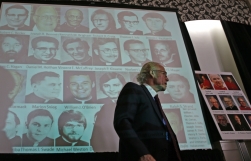
The case of teacher Sarah Pendleton, who has won an Employment Appeal Tribunal (EAT) case against her school, is disturbing and depressing.
Pendleton lost her job at Glebe Junior School in Derbyshire after her husband, a headteacher at a different school, was found to have taken secret pictures of children changing. A Christian, she decided to stay with him because she had made marriage promises in the sight of God. Her headmistress Jan Seymour, in a judgment roundly condemned by a previous tribunal, said her actions "could be seen as condoning his behaviour" and Pendleton was fired.
The EAT said she had faced religious discrimination too, as it was her faith that had led her to stand by her husband.
It isn't the religious aspect of the case, though, that is worrying, though it's good to see this result; it's a recognition that faith really does matter. Far more concerning are the assumptions behind the dismissal in the first place.
Let's not minimise the offence committed by Matthew Pendleton. His crime was a gross betrayal of trust in pursuit of perverted sexual gratification. We rightly recoil at this attack on the innocence of children. He paid a just penalty and his life will never be the same again.
However, what we have here is an example of the demonisation – almost literally so – of a particular type of criminal. Nothing is too bad to say about someone with a sexual interest in children. They are beyond understanding, beyond sympathy and certainly beyond forgiveness. Consequently, in Seymour's reasoning, anyone who does manage to forgive, as Sarah Pendleton did – because he offended against her and against their marriage, as well as against the children – is tainted with the same moral flaw. If she fails to demonstrate her condemnation of him by leaving him, she is a partaker in his guilt.
There are echoes here of the extreme fundamentalism demonstrated in some of the more austere Christian sects, which practise "shunning" as a means of church discipline. Those who refuse to toe the line are shunned as well. The sinner becomes a non-person.
There are two lessons to learn from this, and neither of them are particularly easy ones. The first is that while there is never, ever any excuse for the sexual exploitation of children, revulsion at a crime should not be transmuted into a wholesale abhorrence of the criminal. Just as no one is wholly good, no one is wholly evil, either.
Matthew Pendleton has been utterly shamed and will never be allowed to work with children again, but he remains a child of God. There is within him the capacity to be forgiven and renewed. The secular fundamentalism that seeks to brand people sexually attracted to children as the incarnation of evil, beyond any kind of redemption, has to be resisted.
The second is that Sarah Pendleton's decision to stay with her husband, far from being an example of collusion in his crime, is actually an extraordinary example of grace. She is likely to face criticism not only from people like Seymour, but even from fellow-Christians. Surely, some sins are unforgivable?
But only those who have no concept of the scale and scope of Christian forgiveness would argue like that. Forgiveness is fundamental to Christian faith. While at its root it simply means setting aside the right and desire for revenge, Christians are called to go further and love their enemies. And while forgiveness is a complex, slow-growing spiritual process requiring a Spirit-filled commitment, we do believe it's possible for relationships to be restored and trust to go again. Jesus does not exclude certain sins from his commandment. He doesn't say, "Love your enemies, unless they're paedophiles."
This is a message that's likely to be extremely unpopular with the world in general. But it is not an attempt to excuse or downplay the seriousness of sexual acts against children, which are profoundly evil. It is an attempt to say that, in the words of Romans 5:20, "where sin increased, grace increased all the more".
This case demonstrates very clearly the collision of two world-views, one secular, one Christian. By its nature, even Christians might struggle to sympathise with Sarah Pendleton. But they should go back and read their Bibles, and pray for her.
Follow Mark Woods on Twitter: @RevMarkWoods

















